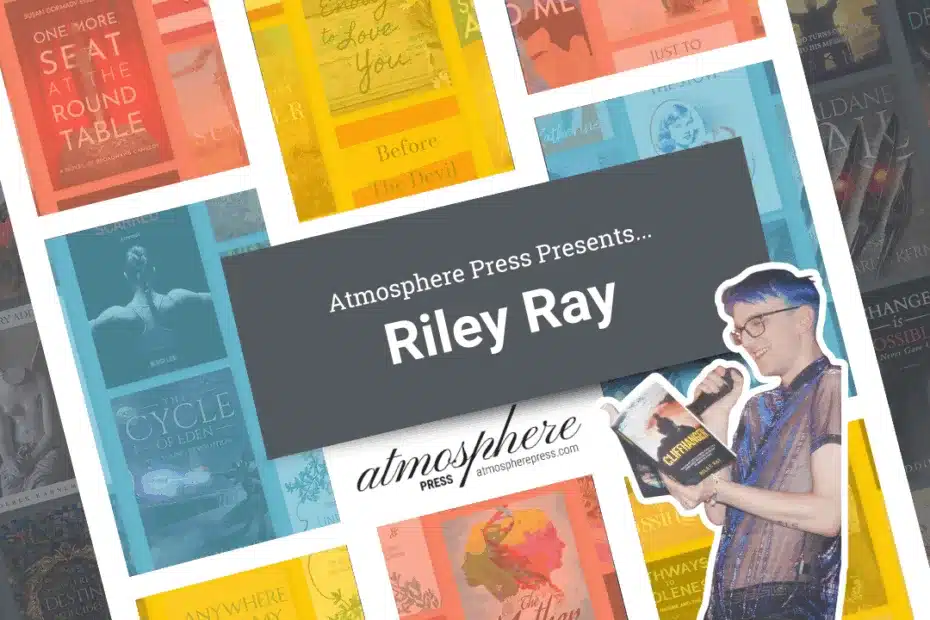An Interview with Riley Ray

Riley Ray is a poet, writer, and published author whose work delves deep into love, loss, and healing. His poetry collections, Cliffhanger and Swimming in Chaos, unravel the raw aftermath of losing a loved one to suicide, blending prose and poetry to tell his story unfiltered and unapologetically.
As a gay man, Riley weaves LGBTQ+ themes into his writing—often bold, emotionally intense, sensual, and at times triggering. Each piece is a mirror reflecting pain, passion, and the process of survival.
Through crafting these collections, Riley has learned to navigate his trauma, using his voice to spark difficult but necessary conversations. His work invites readers to confront their own truths and find connection in shared vulnerability.
“If you take the soul away, all you have is the skeleton. It will tell you the anatomy of my story, but you won’t get the heart. What is a story without a heart?”
What inspired you to start writing this book?
Just like any story, it started with love. I was falling in love with a boy, and the intense feelings that I was navigating felt like they needed to come out in physical form. At first it started as silly little love poems, but then turned into a whole story. In the midst of the breakup, I realised this story was about much more than that as the feelings of grief started coming out.
Tell us the story of your book’s current title. Was it easy to find, or did it take forever?
The book was initially called “Table For One.” It was supposed to be about navigating my lone nature, traveling abroad, seeking a place to call home but never quite finding it. It was always going to be told through prose and poetry, but it wasn’t until the breakup that I realised a lot of the feelings went back to my first love, the guy who committed suicide. For this (and many reasons I won’t spoil), the book ended up being called Cliffhanger. But it felt like a natural process; the name randomly came to me when my friends and I were discussing cliffhangers.
Describe your dream book cover.
Me sitting on the cliff overlooking the most beautiful sunset. I believe that would capture the feeling of the book completely.
If your book had a soundtrack, what are some songs that would be on it?
Funny you mention that—I came up with a whole playlist when I was putting together the promo material for the book. The playlist is called “Be Your Own Reason For Hope,” and it includes songs such as “Mind is Prison” by Alec Benjamin, “After Glow” by Taylor Swift, and “Hey You” by Lea Michele.
What books are you reading (for research or comfort) as you continue the writing process?
I am currently reading poetry books by indie authors Feeling This Way by Ben Esquada was particularly fantastic to read as I rarely find poetry books that tell a story. As my book focuses on the story first and foremost, it’s important for me to read books that follow a similar narrative as I continue expanding on my literary world.
What other professions have you worked in? What’s something about you that your readers wouldn’t know?
We could spend an hour on my little side quests alone! I grew up working in hospitality (fine dining, fast food, events), summer jobs abroad selling tours/being a tour guide, and currently working in banking.
Who/what made you want to write? Was there a particular person, or particular writers/works/art forms that influenced you?
Writing was never a staple in my life. It wasn’t until I randomly took out my phone and started to write down my thoughts that I realised I was writing poems. I find myself consuming media through movie/music/TV shows. I wasn’t used to reading as much when I started my writing journey.
Where is your favorite place to write?
When on the move. Walking/on the train/plane… I find that I write my best introspective places when my body is in motion.
What advice would you give your past self at the start of your writing journey?
Just do it. Don’t overthink the process, do not even think about the publishing world. Just write the story that you want, how you want. The rest will fall into place.
What’s one thing you hope sticks with readers after they finish your book?
I hope that the readers see a glimpse of themselves in my words. Hope that through spilling my trauma and writing it out, the readers are able to heal or understand parts in themselves that they didn’t before. I hope that it’s seen as a hug to their younger selves, as it was to mine.
Are you a writer, too? Submit your manuscript to Atmosphere Press.

Atmosphere Press is a selective hybrid publisher founded in 2015 on the principles of Honesty, Transparency, Professionalism, Kindness, and Making Your Book Awesome. Our books have won dozens of awards and sold tens of thousands of copies. If you’re interested in learning more, or seeking publication for your own work, please explore the links below.
